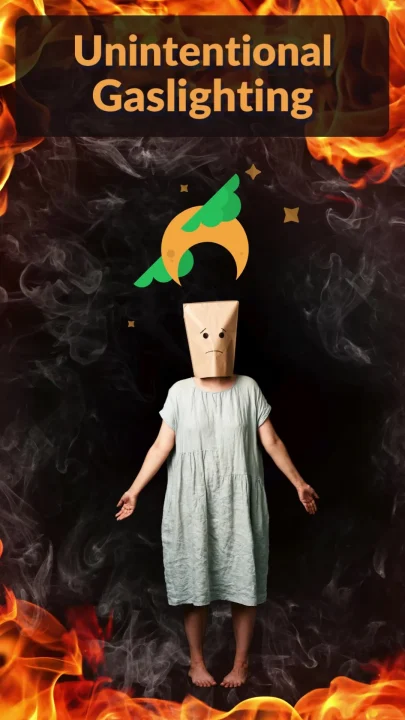Today's Saturday • 10 mins read
— Reviewed by Dr. Sandip Roy.
Suppose you and your friend are talking about sharks, and you say:
“Sharks don’t have a single bone in their body.”
And they respond,
“You’re just guessing — you’ve never seen a live shark in your life. I’ve seen two with my own eyes.”
Now, the truth is, while they have had two encounters with live sharks, their knowledge of shark bones is no more extensive than that of an average person.
They intended not to gaslight you for personal gain, but merely to get an upper hand in a friendly conversation. This was unintentional gaslighting.
When regular people with no hidden agenda try to prove you wrong, it could be unintentional gaslighting. Learn how to spot and stop this subtle emotional abuse.
What Is Unintentional Gaslighting?
Unintentional gaslighting is when a person’s actions unintentionally gaslight another person. Their words or phrases instill doubt and confusion in the victim, but when confronted, they genuinely deny any wrongdoing. Despite no harmful intent, their actions can still cause emotional distress.
Often described as mild gaslighting, unintentional gaslighting differs from classic gaslighting in that it lacks any malevolent intent to manipulate someone’s perceptions.
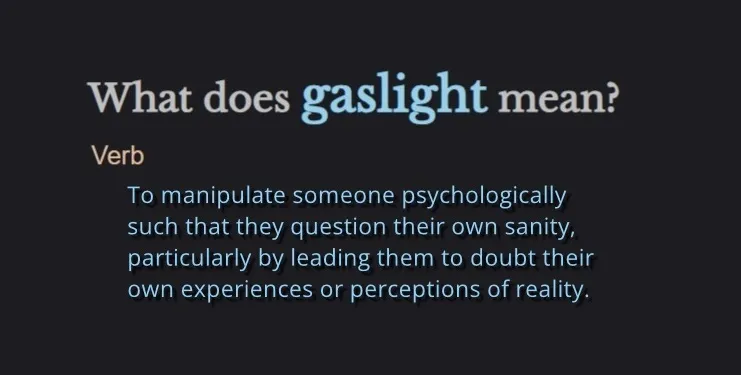
- Unintentional gaslighters are often ordinary individuals who are unaware that they have just gaslighted someone.
- In plain words, they present false information with the mild goal of convincing you to embrace their viewpoint, without trying to take away your ability to think independently.
- Unintentional gaslighting can be hard to identify. It may not be obvious right away if they are simply trying to win the argument, being insensitive, or unintentionally manipulating you.
Unconscious Gaslighting vs. Unintentional Gaslighting
| Aspect | Unconscious Gaslighting | Unintentional Gaslighting |
|---|---|---|
| Definition | Occurs when the gaslighter is unaware they are gaslighting | Occurs when the gaslighter’s actions unintentionally gaslight |
| Motivation | Rooted in the gaslighter’s own psychological defenses or issues | Stem from a desire to help, protect, or avoid dispute |
| Examples | Downplaying feelings because of discomfort with emotions | Telling someone they are overreacting to calm them down |
| Awareness | No conscious intention to deceive or control | Aware of their actions but not the gaslighting effect |
| Key Differences | Intent and Awareness: Unaware of behavior and effects | Intent and Awareness: Aware of actions but not the harmful impact |
| Impact | Driven by internal disputes and needs | Stems from misguided attempts to help or protect |
| Recognition & Correction | May be more challenging due to lack of awareness | Easier to address once the gaslighter is aware of the impact |

5 Unintentional Gaslighting Examples
Even when unintentional, gaslighting can still damage someone’s mental and emotional well-being.
Here are some examples:
- Lack of communication: If your friend was going through a tough time recently and you didn’t text them back for days, you might be unintentionally gaslighting them without realizing it. You may have been busy, overwhelmed, or avoiding the subject they want to discuss. But when they ask why you didn’t contact them, you might make up a story about having a severe backache that left you too mentally disturbed to reach out.
- When trying to help: Gaslighting can also occur unintentionally when you’re attempting to assist someone. For example, if you’re helping your friend and they become upset with you for not doing it the way they wanted or expected, you might have been unintentionally gaslighted by them.
- In romantic relationships: In a romantic relationship, one partner might unintentionally gaslight the other by dismissing their feelings or concerns. For instance, if one partner shares their feelings about an issue and the other responds with, “You’re just being too sensitive,” this can make the first partner doubt their own emotions and experiences.
- At the workplace: A coworker or supervisor might unintentionally gaslight an employee by downplaying their accomplishments or attributing their success to external factors. For example, saying something like, “You only got that promotion because the boss likes you,” can make the employee doubt their own abilities and achievements.
- In parenting: Parents might unintentionally gaslight their children by dismissing their emotions or experiences. For example, if a child is upset about being teased at school and the parent responds with, “It’s just kids being kids,” the child may begin to question the validity of their own feelings.
One of the mild gaslighting examples is your boss or your partner suggesting that you are exaggerating a personal experience or misremembering a fact, casting doubt on your own perceptions.
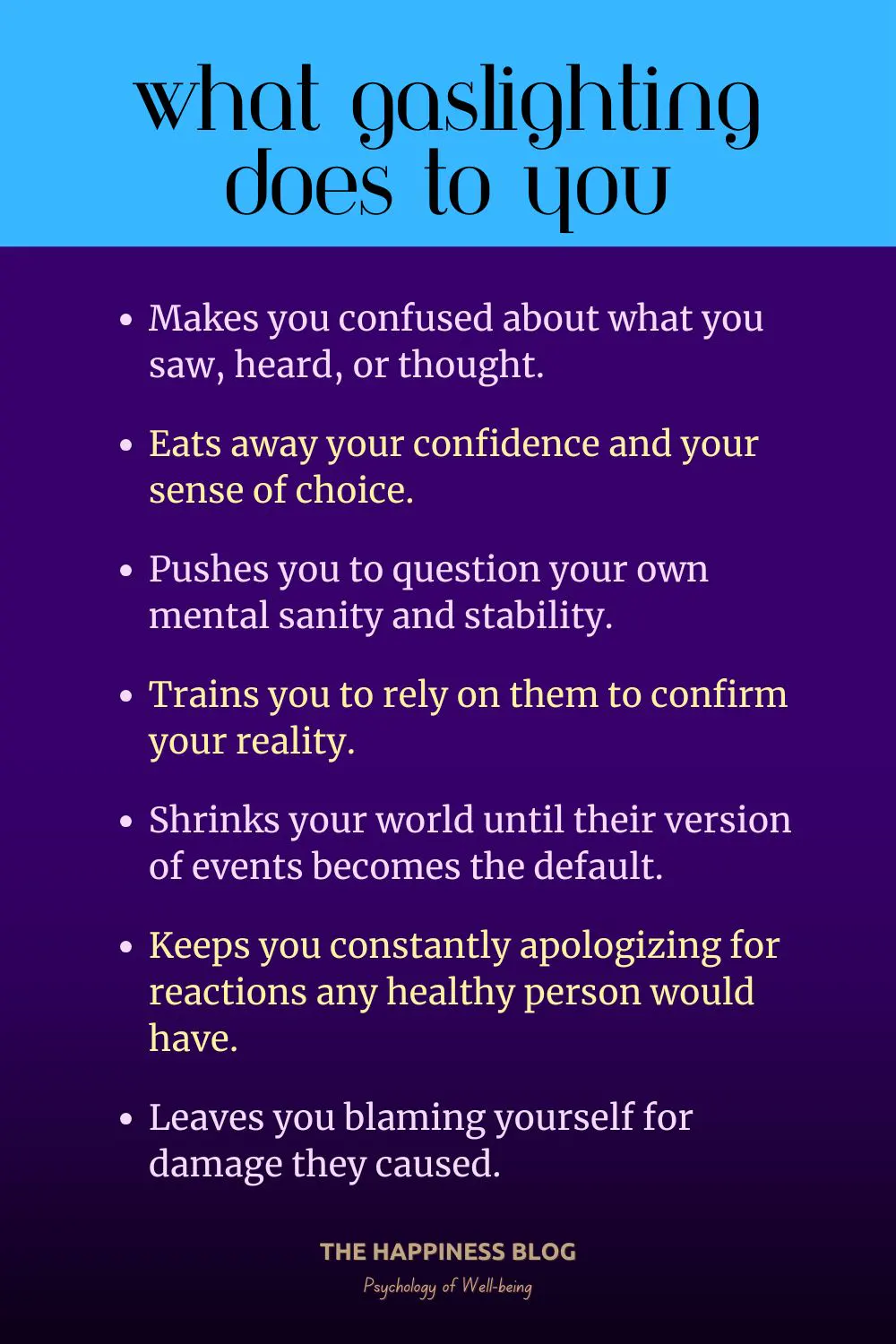
Causes of Unintentional Gaslighting
Unintentional gaslighting may occur due to:
- unconscious parental influence (from a habitual gaslighter parent),
- a hidden narcissistic desire to assert oneself as more knowledgeable, or
- a harmful tendency to undermine the other person by proving them incorrect.
- unintentional gaslighting can also come from cultural or societal conditioning.
People may have been taught to downplay or dismiss certain emotions, experiences, or concerns, like these below:
- “Boys don’t cry”: This phrase reinforces the stereotype that boys should not show vulnerability or express ‘weaker’ emotions like sadness or crying, prompting them to suppress their emotions.
- “Man up”: This expression submits that men should display toughness and resilience in the face of adversity, and should dismiss any need for emotional support or understanding.
- “You’re overreacting”: Telling someone they are overreacting can be a way to dismiss their feelings, making it difficult for them to openly express their emotions or concerns.
- “Don’t be so sensitive”: This statement implies that an individual’s emotional reactions are unwarranted, leading them to downplay or suppress their feelings.
- “It’s not a big deal”: This minimizes the importance of a personal experience or emotion. And may dismiss the person having it, making it difficult for them to seek support or validation.
The society-given behavior gets internalized, leading them to gaslight others, without intending to harm them.
Nevertheless, it harms.
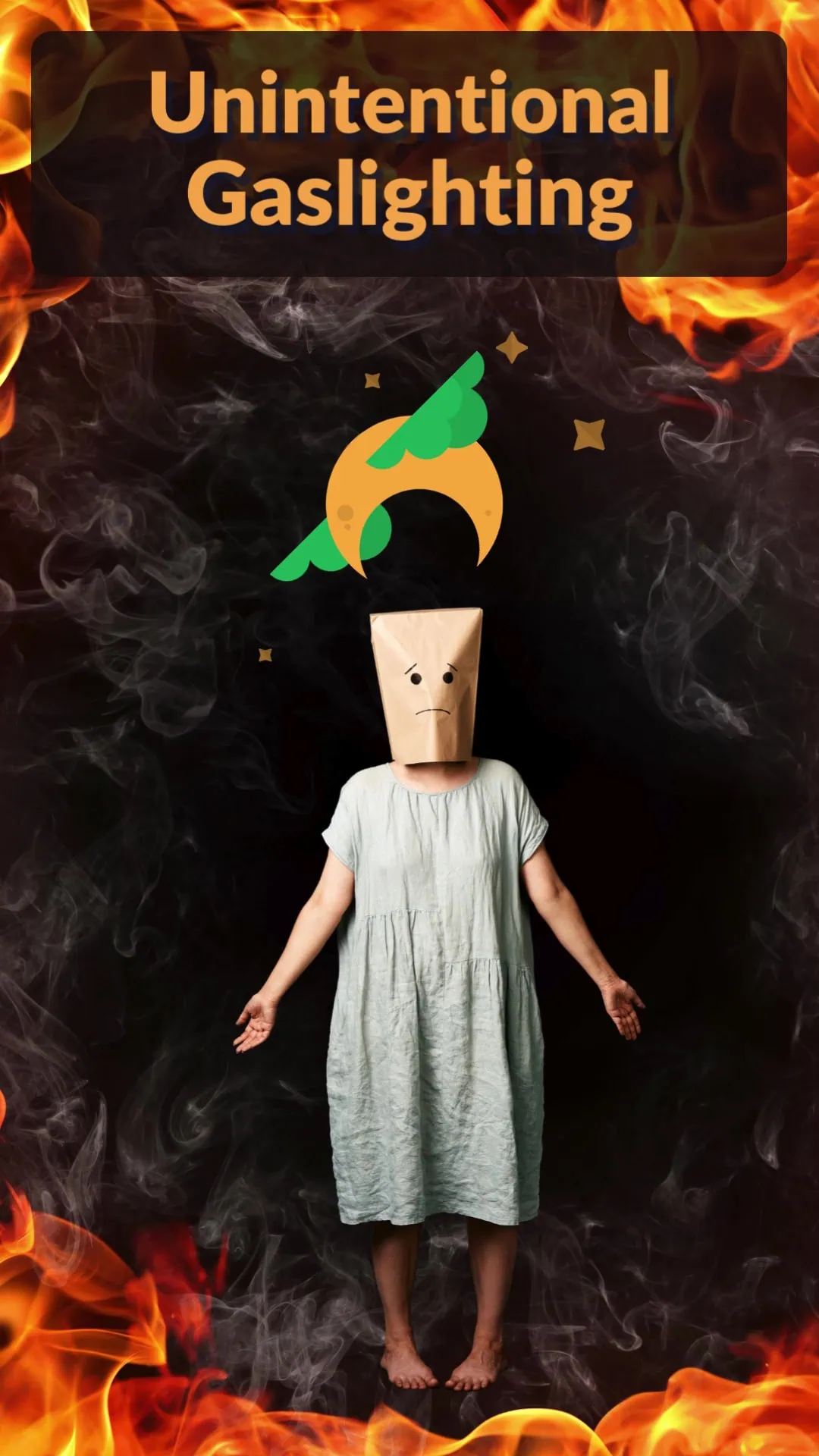
Unintentional Gaslighting Signs
There are a few telltale signs that one is being victimized by unintentional gaslighting:
- Self-doubt: One may feel like they cannot trust their own judgment or perceptions anymore, constantly second-guessing themselves.
- Unexplained emotional distress: They have trouble understanding why they feel so upset when they believe they shouldn’t be.
- Dismissed emotions: They feel like no one cares about their feelings or that their emotions don’t matter, leading to a sense of isolation.
- Lack of credibility: They feel like no one believes them, even when there is proof to support their claims or experiences.
- Confusion and anxiety: A pervasive sense of confusion and anxiety can develop as they struggle to reconcile their experiences with the contradictory messages they receive from the unintentional gaslighter.
Are You Unintentionally Gaslighting Someone?
To find out if you are unintentionally gaslighting someone, check these signs:
- You frequently question the other person’s version of reality, and you often feel compelled to persuade them to believe your main story with a made-up side-story.
- You often have a strong desire to prove the other person wrong whenever they express an opinion, even when you’re fully aware that they are right.
- You want to discredit and prove them wrong so that you can relieve your painful feelings of envy or jealousy of their popularity or superiority.
- You try to put the other person down, knowing they won’t resist too much. You aim to cope with your feelings of inferiority or low self-esteem. (Research confirms that low self-esteem and depression are strongly related.)
- You unknowingly mirror the behavior of a parent who often lovingly corrected your other parent, by frequently pointing out their mistakes.
- You emotionally manipulate them by suggesting that you may harm yourself if they don’t comply with your wishes.
- You notice the other person in your relationship begins to lose confidence, acts confused or paranoid, doubts their own sanity, and increasingly relies on you for even minor decisions.
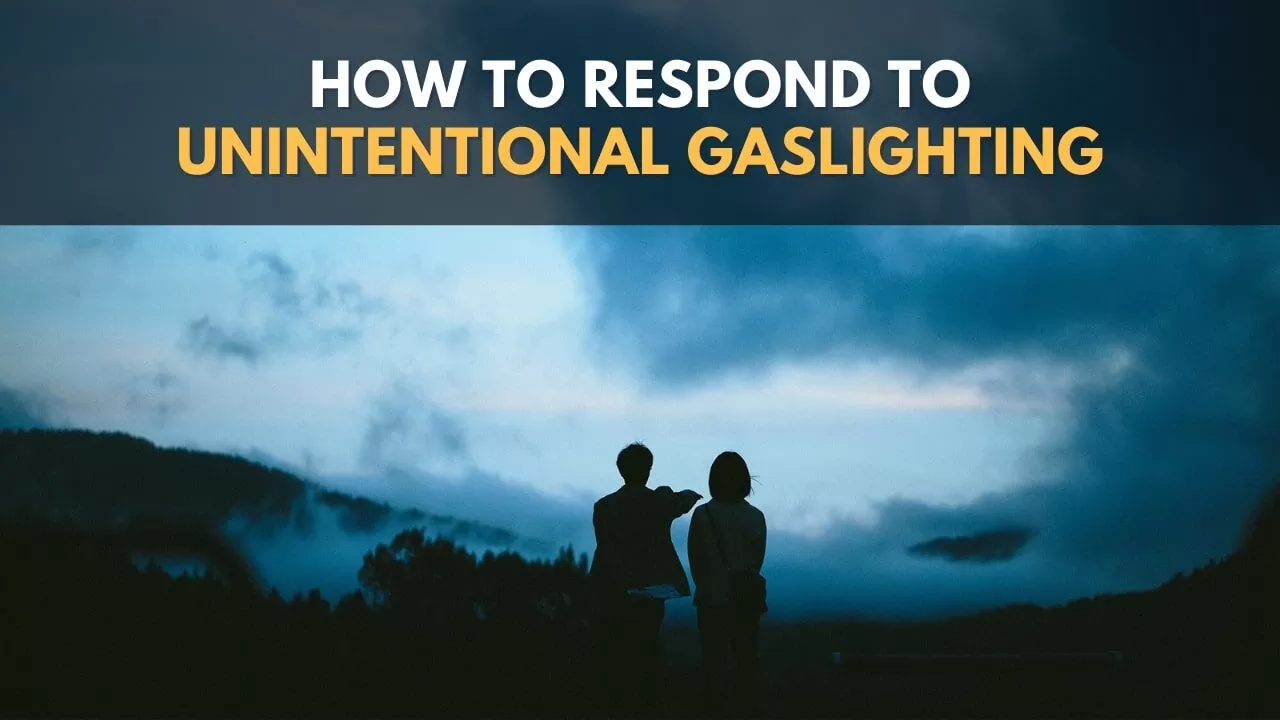
You could be the gaslighter you’re looking for in others.
How To Stop Unintentional Gaslighting?
Here is how to respond to gaslighting when it is unintentional:
- Identify and document their behaviors: Keep a record of incidents to help you recognize patterns and better understand the situation.
- Address the gaslighter directly with proof: Present evidence of their gaslighting behavior and calmly discuss the impact it has on you.
- Ask questions for clarity: Seek to understand their intentions and record their replies to hold them accountable and facilitate constructive conversation.
- Offer support and reassurance: Encourage them to seek help from a mental health counselor, and assure them that you’re willing to work together on the issue.
- Offer an alternative perspective: Gently suggest they become more aware of their behavior and its consequences, promoting self-reflection and growth.
- Maintain your self-esteem: Stand firm in your beliefs and values, and don’t allow yourself to be belittled, insulted, or assaulted by the gaslighter.
- Set boundaries and protect yourself: Minimize exposure to gaslighters when possible, and consider leaving the relationship if they show no signs of changing their behavior, prioritizing your well-being. Set healthy boundaries with them.
- Be aware of your own vulnerability to gaslighting. Learn to rise against the unintentional gaslighters in your life, and start to question their intentions.
- Mindful self-awareness: Self-awareness and self-compassion can help heal from the damage caused by unintentional gaslighting and restore respectful communication in your relationship.
- Understand your own communication patterns: Knowing how you talk and react emotionally to others allows you to identify and correct your accidental gaslighting behaviors.
Seek a professional psychological counselor’s help to address your susceptibility (“naïveté”) to become more vigilant and resilient to unintentional gaslighting.
FAQs
Can you accidentally gaslight someone unintentionally?
Who are the victims of unintentional gaslighting?
How to stop your unintentional gaslighting?
Allow yourself an intentional pause between your feelings and your reactions.
Be aware of subtler habits such as twisting or spinning information, selectively omitting facts, or presenting false information.
Do not burden yourself with guilt or shame, and instead, recognize that your past doesn’t truly define your present self.
Final Words
[Fact: Sharks do not have bones, but they do have skeletons made entirely of cartilage that serve as a supportive framework for their bodies.]
Here are 3 take-home messages:
- Gaslighting is a powerful form of emotional abuse that can manipulate unsuspecting people into doubting their reality and questioning their sanity.
- Both intentional and unintentional gaslighting can cause serious confusion and distress, leading victims to blame themselves.
- Keep an eye out for spotting and confronting gaslighting in relationships to protect your well-being and maintain your sense of self.
Unintentional gaslighting often occurs when you are “the less powerful one” in a relationship. To spot it early, know these classic gaslighting phrases.
• • •
Check out the ten subtle signs of gaslighting:
√ If you liked it, please spread the word.
» You deserve happiness! Choosing therapy could be your best decision.
...
• Disclosure: Buying via our links earns us a small commission.
